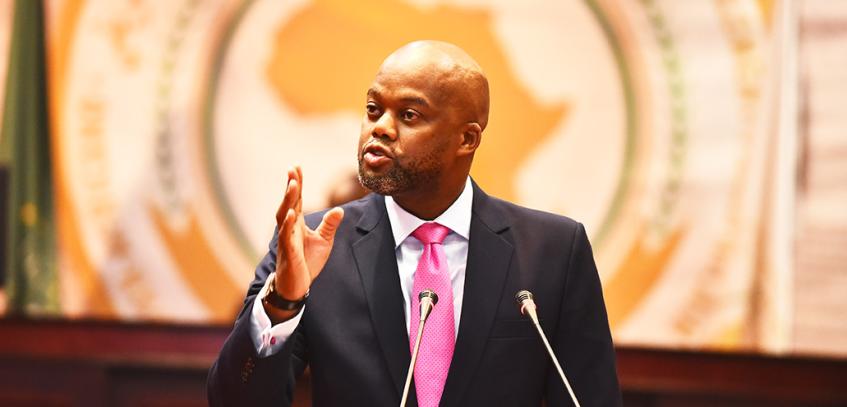The African Continental Free Trade Area (AfCFTA) Secretary General, HE Wamkele Mene, has paid tribute to the Pan-African Parliament (PAP) as a continental platform and vehicle for the African people to realise their aspirations.
He added that the AfCFTA will draw from the PAP’s expertise in a wide range of spheres to achieve an integrated Africa. Speaking in his first-ever address to the PAP, HE Wamkele Mene recognised the PAP as a much more seasoned and well-established organ of the African Union (AU) and also noted that the AfCFTA mandate is broad and expansive and cannot be achieved without the PAP’s support.
“Let me honour the important work of the Pan-African Parliament in providing a unique platform for African peoples and their grass-roots organisations to be more involved in discussions and decision-making on critical continental issues. This PAP Committees Sitting, convened under the African Union 2023 theme of the year “The Year of AfCFTA: Acceleration of the African Continental Free Trade Area Implementation,” portrays your determination to stay tuned to the times and resolve and commitment to work towards the realisation of this momentous flagship project of the African Union,” said HE Wamkele Nene.
This historic engagement is taking place as the Permanent Committees of the PAP are sitting in Midrand, South Africa.
Reiterating the significance of the AfCFTA, PAP President HE Chief Fortune Charumbira, underscored the eagerness of the PAP to witness the successful execution of the AfCFTA.
“We are keen as a Parliament to see that the integration of Africa is achieved. How do we complement the AfCFTA? Each and every one of our Committees have to tune into the implementation of the AfCFTA as every one of us has a key role to play,” said HE Chief Charumbira.
The Permanent Committees to this end have already worked on their work plans for the year to reflect activities the Committees will undertake towards the acceleration of the AfCFTA implementation as dictated by the AU theme for 2023.
Noting that Parliaments are the principal democratic institutions which can communicate trade issues to the vast people of Africa, the AfCFTA Secretary-General indicated his keenness in sustaining the engagement with the continental Parliamentarians. He also acknowledged the oversight role of the legislature in scrutinizing the actions of governments and influencing the direction and outcomes of trade talks.
Considerable progress has been made in relation to the Agreement as to date, 47 Member States have ratified the AfCFTA agreement, out of which 46 have deposited their instruments of ratification to the Chairperson of the African Union Commission (AUC) making them State Parties with rights and obligations under the agreement. The AfCFTA Dispute Settlement Mechanism (DSM) was operationalized with the inaugural meeting of the Dispute Settlement Body (DSB) in April 2021. The selection process for the Members of the Appellate Body has almost been completed, with the selective of five out of seven persons to serve on the Body meaning that for the first time on the continent, the free trade in goods and services would be backed by a robust dispute settlement framework under the AfCFTA.
“We have completed the easiest part – that is for all the member states to negotiate a single set of rules. The most difficult part is implementation, and the designation of 2023 as the theme of the year to accelerate the implementation of the AfCFTA, is indeed, well-timed. Accelerated implementation of the AfCFTA will without doubt promote economic dynamism among our Member States.
“A recent study by the World Bank, in partnership with AfCFTA Secretariat, for example, indicates that the Agreement if fully implemented, would raise incomes in Africa by 9 percent by 2035 and lift 50 million people out of extreme poverty. At the end of the day, the success of the AfCFTA will boil down to political will, discipline in execution, and the active management of conflicts that arise as implementation continues,” HE Wamkele Mene said.
In conclusion, HE Wamkele Mene said:
“Parliamentarians must, therefore, continue with their efforts to find solutions to these and other pressing issues in the member states for the benefit of our continent. Finally, we must all work closely together to make 2023 a year of action, one that will be remembered as the dawn of a new era of intra-African trade.”
-Ends-








